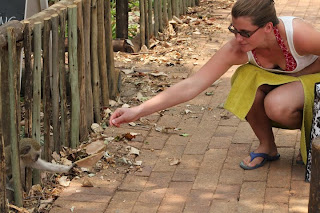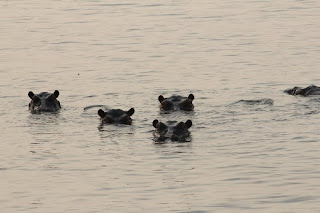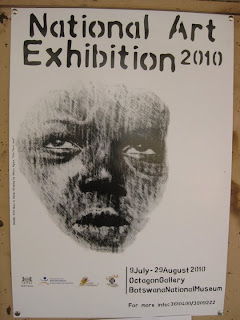Amanda and I decided to take a vacation to a village called Kasane, in the most northeastern corner of Botswana. Kasane sits on the border, near the junction of four countries (Zimbabwe, Zambia, Namibia and Botswana). The village also sits against the Chobe National Park. Chobe is famous not only for having the largest concentration of elephants in the world but also the largest concentration of game on the continent. The best time to go to Chobe is during the dry season when all the animals make their way to the river, which is one of the only permanent bodies of water in the area. Once the rains come the animals all disperse because water is easier to find. The first rains are usually expected in early November. Therefore, needless to say, we saw a lot of animals.
We took two days to get to Kasane since it is impossible to ride the bus there in one day; the schedules just do not match up but I guess that is the price we have to pay to live so remote. We took the bus to a village by the name of Nata where are friend and fellow volunteer Sydney lives. Nata is a village that is about the same size as Gumare but since it is on a main junction to two of the biggest tourist destinations in Botswana (Chobe and the Okavango) it has a lot more infrastructure. We had a lot of fun visiting Sydney and seeing her village. We also got the opportunity to go swimming at Nata Lodge, which was a great treat. Nata sits on the edge of the Makgadikgadi Pan, which is the world’s largest collection of salt pans covering an area of 6,200 square miles. The lake that used to be here some time ago was bigger than Switzerland.
On our ride up to Kasane we could start to see more and more trees and eventually elephants! At first it was just the lone bull wandering on the side of the road. Once we got closer to Kasane, whole families started appearing on the side of the road. It was funny to see six huge elephants huddled under an acacia tree battling for shade.
The Kasane area is unique in so many ways to the rest of Botswana’s villages. I have heard that Botswana has over 3.5 million cows. In our village, there are cows, donkeys, goats, dogs and chickens running all over the place. Kasane on the other hand, has none of these, except a few dogs. What it does have is a plethora of other more wild animals. Warthogs run all over town eating from gardens and chasing one another through the street. It is also not uncommon to see small monkeys and baboons stealing from garbage bins.
We camped at Chobe Safari Lodge which is a ridiculously beautiful four star lodge sitting on the Chobe river and borders the Chobe National Park. We really felt like we were cheating the system by camping in our little tent for P70 ($10) per night and having full access to the amenities of the lodge. The lodge has an enormous open thatched dining area and bar with a pool overlooking the river. Around the lodge we saw warthogs, monkeys, banded mongeese (and yes the plural of mongoose can be mongeese, and how much cooler is that than mongooses) and at night we could hear Hippos eating. From the pool deck we could see elephants eating along the river, hippos coming up for air and huge herds of buffalo grazing on an island.
 Amanda giving a monkey a leaf, just ‘cause
Amanda giving a monkey a leaf, just ‘cause
Before we left Gumare a friend told us to call his mom because she ran a safari booking company in Kasane. After a day of relaxing at the pool we called Joyce. If you have ever seen the Botswana based movie/TV series Number 1 Ladies Detective Agency (apparently it’s now on HBO) then you can imagine this woman. She is just like the main character on that show, the most kindhearted motherly African woman we have met since coming here. Moreover, this correlation might stem from the fact that she named her booking company after that show, Number 1 Ladies Travel Agency. She came and met us at the lodge and offered to put us on any bookings she got that we wanted to go on; all we had to do was pay the park entrance fee! She called us later that evening to say that we would be joining some Germans on a six hour safari the next day leaving our lodge at 6 am.
The next morning we woke up early (which is hard to do when the hippos keep you up all night) and hopped on the waiting safari Land Cruiser. Our guide was the inspiringly knowledgeable Gaba (pronounced ha-ba) who could name every animal, tree, poop and track we asked him. The unavoidably bummer part about going on a game drive out of Kasane into Chobe is that all of the drives pretty much leave at the same time so it’s a bit of a traffic jam for the first few kilometers. Most people book a three hour drive but we got put on a six hour drive which allowed us to spend a lot more time driving out farther than most of the other truck. Gaba told us that a lion has been hanging out in the area the past few days so we should all keep an eye out. The sandy road into the park follows the river where the largest concentrations of animals hang out. We saw so many animals! We saw Impala, giraffe, hippos, elephants, kudu, sable, steenbok, gemsbok, crocodiles, warthogs, baboons, ostrich, vultures, eagles, storks and many other birds. And yes, we did find the lion. We actually found two! Both were females and both were resting separately in the shade of shrubs. On our way back to the lodge we had to drive right though large herds of elephants that were on their way to the water for their afternoon swim. It was exhilarating to be completely surrounded by Kalahari African Elephants, the largest living land animals on earth.
 Lion track next to an Amanda track
Lion track next to an Amanda track
 Kori Bustard, the world's heaviest flying bird
Kori Bustard, the world's heaviest flying bird
 Amanda was proud of taking this one
Amanda was proud of taking this one
 Vultures eating a young buffalo
Vultures eating a young buffalo
 Proof God has a sense of humor
Proof God has a sense of humor
 The female lion we were tracking
The female lion we were tracking
 Gaba says this baby is only a few weeks old
Gaba says this baby is only a few weeks old
Once we got back to the lodge we went swimming in the pool and got another call from Joyce letting us know that a boat would be by to pick us up at 3 to go on a sunset boat cruise. The boat cruise felt even more crowded than the first few kilometers of the game drive. Even though our double-decker boat only had six people on it, the river was full of other boats enjoying the same sunset animal viewing. On the boat, we saw crocs, hippos and many elephants. We cruised up the river for a couple of hours and watched the sun burn out while floating next to a big solitary female elephant who was gently plucking her dinner from the grassy island next to us. This is Africa.
 The hippos are always watching
The hippos are always watching
 The baby doesn’t gain use of its trunk until 6 months
The baby doesn’t gain use of its trunk until 6 months
Because of Joyce we saved a lot of money. What did we do with that saved money? We went to the giant buffet at the lodge of course! Not once but twice! In a row! Dinner and breakfast! It was quite possibly the best collection of food I have ever seen. Maybe this was skewed by the fact that we have been living in Africa for the past seven months, but I don’t think so.











































